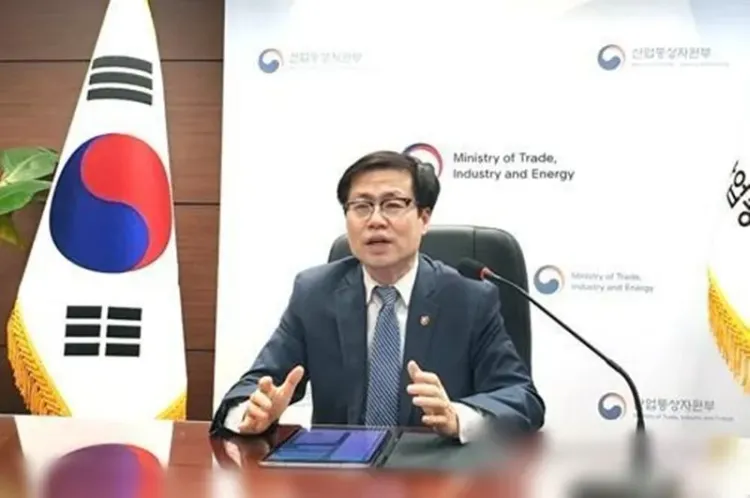How is S. Korea Preparing for Tariff Negotiations with the US?

Synopsis
Key Takeaways
- Comprehensive Strategy: South Korea is formulating a detailed response strategy for tariff negotiations.
- Intense Negotiations Ahead: Both nations are expected to engage in rigorous discussions soon.
- Mutual Benefits: The focus is on securing a win-win agreement.
- Addressing Trade Barriers: The U.S. has raised concerns over South Korea's trade practices.
- Deadline Approaching: Negotiations must be concluded by July 8.
Seoul, June 17 (NationPress) South Korea's chief trade negotiator convened a comprehensive government meeting on Tuesday to strategize for upcoming tariff discussions with the United States, as anticipated additional trade talks are on the horizon, according to Seoul's industry ministry.
Trade Minister Yeo Han-koo engaged with representatives from finance, land, agriculture, oceans, and other ministries involved in the ongoing tariff and trade negotiations between Seoul and Washington, as reported by the Ministry of Trade, Industry and Energy.
The meeting aimed to formulate a well-rounded response strategy for each topic under negotiation, the ministry noted, as per reports from Yonhap news agency.
During the discussions, Yeo urged the ministries to proactively consider actions that could lead to a mutually beneficial agreement for both nations, highlighting that the allies are expected to undergo "intense" negotiations shortly.
"South Korea has fallen behind other major nations in trade discussions with the U.S. due to various uncertainties," Yeo remarked, seemingly referencing the recent leadership transition in the country.
"With a government that possesses democratic legitimacy, we must strive to successfully finalize trade negotiations with the U.S.," he continued. "This situation should provide us with an opportunity to bolster our industrial competitiveness and generate new growth avenues by refining our systems and easing regulations in accordance with the new government's growth philosophy."
When inquired about the timeline for meeting his U.S. counterpart for further negotiations, Yeo mentioned that his ministry was still coordinating his trip to Washington and indicated that Seoul would engage in "shuttle" meetings at the trade minister level along with technical discussions with Washington in the near future.
A planned meeting between South Korean President Lee Jae Myung and U.S. President Donald Trump at the ongoing Group of Seven (G7) summit in Canada did not materialize as the U.S. leader departed the event unexpectedly due to the Israel-Iran conflict.
Seoul aspires to achieve a complete exemption or reduction of U.S. reciprocal tariffs and heavy duties on all steel and automobile imports by negotiating a comprehensive package that includes tariffs, non-tariff measures, economic cooperation, and other trade matters by July 8, when the U.S. administration's suspension of reciprocal tariffs, including a 25 percent duty for South Korea, is set to expire.
The Trump administration has raised concerns regarding South Korea's significant trade surplus with the U.S. and various non-tariff trade barriers.
Earlier this year, the office of the U.S. Trade Representative (USTR) released an annual report on foreign trade barriers, highlighting a variety of South Korea's non-tariff measures, such as its ban on imports of American beef from cattle older than 30 months, emissions-related regulations affecting imported vehicles, and restrictions on the overseas transfer of high-precision map data.









